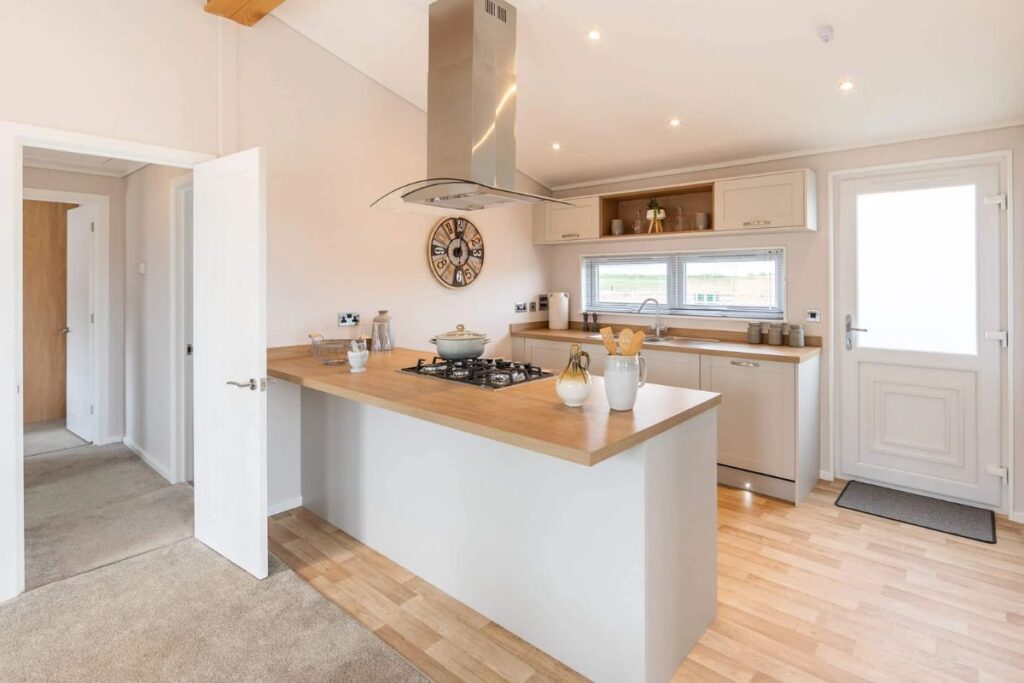
Start your new home journey
Request A Brochure
Book a Park Visit
Holiday Park vs Residential Park: Understanding the Differences

When looking into UK park homes, you’ve likely come across both holiday parks and residential parks and may have wondered what sets them apart. The key difference lies in their purpose – holiday parks are designed for short-term stays, while residential parks provide permanent living solutions.
Holiday parks offer vibrant, lively spaces ideal for seasonal getaways, and often tailor activities and amenities to holidaymakers. In contrast, residential parks focus on long-term permanent residences, offering a strong sense of community.
At Tingdene Parks, we combine peaceful surroundings with welcoming, vibrant communities, all within residential parks carefully designed around the needs of our residents. If you’re new to the idea of park living, our Beginner’s Guide is the perfect place to start. It’s packed with helpful insights and practical tips to support you as you explore what could be your next best chapter!
Characteristics of a Holiday Park
Holiday parks are designed for temporary stays and leisure, offering a range of facilities like swimming pools, sports courts, and entertainment facilities. They allow visitors a chance to enjoy a break from everyday life without the commitment of permanent residency. Additionally, holiday parks are open to people of all ages, whereas residential parks are typically only for people over 45.
However, even if a holiday park operates year-round, permanent residency isn’t allowed, and proof of a primary home address is usually required. Despite many holiday home manufacturers now building to BS3632 standards, these homes are still intended for seasonal use to comply with the park’s holiday home-only licence.
Features of Residential Parks

Residential parks are designed to provide a secure and welcoming environment for permanent living, guided by strict standards like the British Standard BS3632. Residents enjoy the reassurance of legal protection under laws such as The Mobile Homes Act 2013, which clearly defines the rights and responsibilities of both homeowners and park operators.
These high-quality homes are built with comfort and durability in mind, ensuring they are suitable for year-round occupation. For those who love to travel, lock-up-and-leave properties provide the flexibility and freedom to embrace life on their own terms.
Community Difference

Beyond the homes themselves, life on a residential park offers more than comfort and convenience – it’s about being part of a close-knit, welcoming community. Neighbours know each other by name, look out for one another, and take pride in creating a friendly, supportive environment. Unlike holiday parks, where guests come and go, residential parks are home to a stable, settled community, a place where lasting friendships are made. Families are at the heart of these parks. Children are very welcome to visit and stay, and you’ll often see grandchildren enjoying time with their grandparents.
Whether it’s a quick chat over the garden fence or helping out with the odd job, life on a Tingdene residential park has a natural rhythm that brings people together. It’s an ideal setting for those who enjoy an active, social lifestyle, with the kind of neighbourly spirit that turns a house into a home.
3 Key Legal and Regulatory Considerations
It is important to understand the different legal considerations between a holiday park and a residential park. Factors such as council tax obligations, pitch fees, and compliance with standards like the British Standard BS3632 can significantly impact your lifestyle and budget.
1. Understanding Council Tax Implications

Those living in residential parks are typically subject to pay council tax, similar to traditional homes. However, the tax bands are often lower due to the smaller size and value of these homes, making them a more cost-effective option for permanent living.
In contrast, holiday homes generally do not incur council tax if they are only used for short-term stays. This exemption can make holiday parks an attractive choice for those seeking a flexible retreat.
It’s important to confirm council tax obligations with local authorities, as these can vary depending on your circumstances. Be sure to check for any available exemptions or concessions to help manage your costs more effectively.
2. Pitch Fees and Costs

Both residential and holiday park operators require residents to pay pitch fees, also known as site fees, but the structure and inclusions often differ.
In residential parks, these fees typically cover:
- ground rent
- site maintenance
The cost of these fees can vary depending on the park’s location and the amenities provided.
On the other hand, holiday parks often charge higher pitch fees during peak seasons due to the temporary nature of stays. These fees may cover fewer services or amenities compared to residential parks.
Before you commit to a park, carefully review the fee structure to understand what it includes and whether any costs may change over time. It’s also important to ensure the park aligns with your needs, as committing to a residential park is only suitable for those who are semi-retired or retired. It’s important to understand that holiday parks are not permanent living solutions, so they would not be appropriate if you’re retired and looking for a full-time residence.
3. Compliance with British Standard BS3632

Residential parks must meet the British Standard BS3632, ensuring they are built to the same quality and safety standards expected of traditional bricks-and-mortar properties. These homes are durable and sturdy, designed with excellent energy efficiency, and essential safety features, ensuring a secure and comfortable place to call home.
Holiday parks, designed for seasonal or temporary use, typically don’t offer the same legal protections as residential parks.
However, they are still required to prioritise health and safety considerations. Holiday parks must obtain a site licence, a mandatory legal document that specifies the conditions under which the park operates. This licence helps the park comply with land use regulations, safety standards, and facility requirements. For holiday homeowners, understanding the site licence is crucial, as it outlines how they can use their holiday property, including restrictions on permanent residence and obligations for maintenance.
Final Thoughts

It’s understandable to feel uncertain when distinguishing between holiday parks and residential parks, given the similar aesthetics of the parks and homes themselves. It is crucial to remember that the difference between a residential park and a holiday park lies in their purpose – holiday parks are perfect for short-term getaways with activity-filled settings perfect for the entire family, while residential parks are designed for people in a specific age group, typically retired or semi-retired, seeking a permanent, community-focused lifestyle. If residential park home living is what you’re looking for, then Tingdene Parks are here to make the transition into retirement living seamless, offering homes thoughtfully designed to meet your long-term needs. Contact us today to explore your ideal retirement home and start your journey with us.
Our Residential Parks
Take your first step to building your perfect lifestyle at a Tingdene residential park
View All Parks